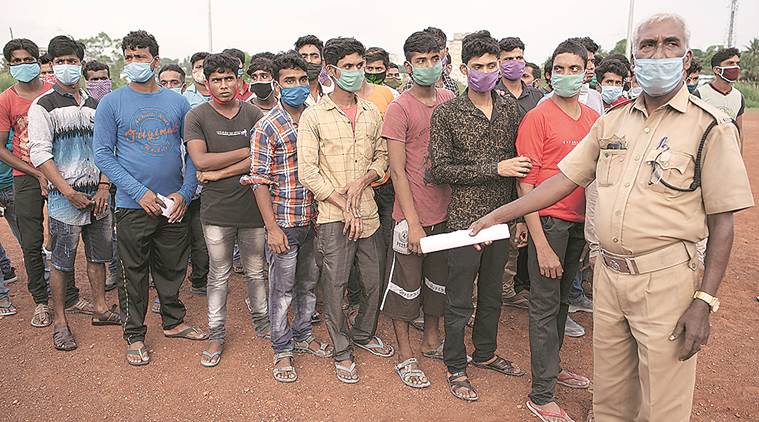- India
- International
As migrant workers leave, Kerala asks: Who will plug the gap?
With at least 3 lakh workers leaving the state amid the Covid lockdown, the pillars that propped up its economy — from construction to manufacturing and farming — are crumbling.
 Over 3 lakh migrants left during lockdown, state is looking at Gulf returnees. (Photo: AP/file)
Over 3 lakh migrants left during lockdown, state is looking at Gulf returnees. (Photo: AP/file)
SHAMEER V T, a labour contractor in Kozhikode, is a worried man. Just over three months ago, he was managing about 150 migrant workers, mostly from the Northeast, who were busy at building sites across the northern district. Today, he’s left with “just six” — and they want a wage hike.
“Business has become costly. Earlier, an unskilled worker was paid about Rs 700-800 for a day’s work. Now, they want Rs 1,000 since there are only a few left,’’ he says.
Shameer’s story, in a nutshell, is Kerala’s new migrant crisis. With at least 3 lakh workers leaving the state amid the Covid lockdown, the pillars that propped up its economy — from construction to manufacturing and farming — are crumbling.
Read| Over 42,000 exit Kerala: ‘We don’t want migrants to leave, will offer all facilities,’ says minister
The only hope now, say stakeholders, is that the workers will return once the pandemic subsides. Or, as Labour Minister T P Ramakrishnan believes, Kerala’s own migrants returning from the Middle East, could fill part of the gap — nearly 72,000 have returned so far, and over 1 lakh more are expected, many of them having lost their jobs to the pandemic distress.

“All sectors are feeling the shortage as we ease restrictions. After the lockdown, 3 lakh workers left for their home states… many are still going back. Over 5 lakh workers had left before the lockdown. Many are willing to return when normal train services resume, and employers are ready to offer quarantine facilities,’’ says Ramakrishnan, a senior CPM leader.
“Now, our hope is that at least a section of expats returning from the Middle East will fill the vacuum for skilled and unskilled work. We are encouraging them to sign up with the skill registry,’’ he says.
Read| An Expert Explains: What is the future of migration from Kerala?
The construction industry is the worst-hit. “About 90 per cent of unskilled work and 40 per cent of semi-skilled jobs is done by migrants. The crisis will become more severe,’’ warns George Thomas, general secretary, Kerala Builders Association.
For instance, a construction site in Thiruvananthapuram, which had employed 2,000 migrant workers, has only 300 left. Uralungal Labour Contract Co-operative Society, a leading firm engaged in government projects, had 4,000 workers. “Now we have 1,000. We have begun a recruitment drive for local workers, including those who lost their jobs in the Middle East,’’ says Shaju S, the managing director.
In central Kerala, the sawmill and plywood industry, which had turned Ernakulam district into a migrant hub, is tottering.
“Manufacturing has come down to 40 per cent. Many units had employed workers from a particular state as a group. They have all gone back. Those remaining are demanding higher wages,’’ says Azees Pandiyarpilly, general secretary, Sawmill Owners and Plywood Manufacturers Association.
Opinion| We need to provide undivided attention to the working conditions of migrants
In farming, the clock is ticking because most of the work happens in sync with the monsoon. In Palakkad, which is known as the state’s granary, officials expect paddy cultivation to be severely hit. “Most of the rice planting is done by migrants from Bengal and Tamil Nadu. Many have left while others are affected by the curbs on inter-state movement,” says a local official.
Pineapple Growers Association president Baby John says that every June, the sector undertakes new planting on around 15,000 acres. “This time, it will not be more than 3,000 acres,’’ he says.
All is not lost yet, says George Mathew, who works among migrants under the Progressive Labour Movement for Justice. “We have started getting calls from workers willing to return because of the better wages,’’ he says.
Apr 25: Latest News
- 01
- 02
- 03
- 04
- 05







































